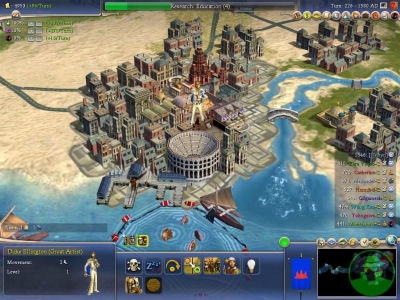The reason espionage will be controversial is because it simply won't be useful to certain kinds of Civilization players. I'm a "peaceful winning" kind of guy. I love building a space ship to go to Alpha Centauri. I live to culture-bomb border cities and stick my tongue out at war-mongers when their citizens like me better and keep joining my empire of joy. I like playing factions off one another, acquiring vassal states and offering covert aide to folks like Tokugawa and Shaka and letting them fight wars for me.
Therefore, I love spies. For players not looking to fight, spies are also insanely useful for disrupting production, fostering unhappiness and unhealthiness in cities and pulling all kinds of dirty tricks that can let them win without firing a shot. The problem is that once the fighting starts, they cease being so useful. They're too easily discovered and killed and their effects just aren't strong enough compared to some of the civics that players can use against them and the amount of resources it takes to run a successful war.
The Apostolic Palace, easily the best new addition to the game, suffers no such imbalances. The palace is a sort of medieval version of the United Nations that makes religion (already a major component of player strategy) the central feature of the game. The Palace (which is based on the structure of the Catholic Papacy) offers players who have at least one city of the Palace's religion the chance to vote on holy edicts such as trade embargoes, forced peace or even declaring holy war amongst all those who share the faith. Players can also use the Palace to win a religious victory by getting all the civilizations in the game to vote for one divine leader. This, by the way, is not an easy thing to do as it requires every civilization in the game to have accepted the Apostolic faith in at least one city and vote for the Palace Resident as ruler of the world.
What makes the Apostolic Palace so much fun is how it shifts the strategic "feel" of the middle game (the Palace is nullified by the invention of Mass Media). In much the way that real-world Popes of the Middle Ages were above yet part of international politics, players who use the Apostolic Palace are forced to consider every action against enemy civilizations in relation to how the Apostolic bloc will feel about it. Going to war against brothers of the faith requires considerably more diplomacy and being a member of a non-Palace religion can get pretty exciting when every member of the bloc decides to declare jihad on you. Peaceful players like me are forced to deal with trade embargoes and keeping good relations with the heathens I've been trading with for badly needed copper when the rest of my co-religionists are champing at the bit for a Crusade. Warriors, on the other hand, will just love being able to gin up said Crusades.






